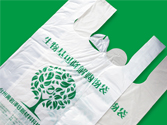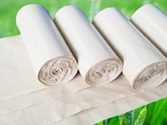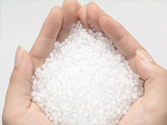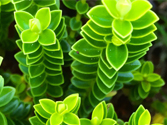In July 2017, China issued by the general office of the state council general office of the state council concerning the ban on imports of foreign garbage entry promote the solid waste management system reform plan circular (hereinafter referred to as "notice"), the formal notice before the end of the world trade organization (WTO) in 2017 emergency ban 4 classes, a total of 24 kinds of solid waste from entering the country. It wasn't until that day that the world discovered that China's days as the world's leading garbage collector were over. For two decades, China was the world's largest importer of waste, a source of materials for the country's booming manufacturing sector. Last year alone, Europe, Japan and the United States exported 27 million tons of waste paper and 7.3 million tons of plastic waste, worth $3.7 billion, or 56 percent of the world's total.
First, the present situation
More than eight million tons of plastic are dumped into the ocean each year. Every minute, more than one million plastic bags are used worldwide. The average "working life" per bag is only 15 minutes. They take 1,000 years to decompose. According to the journal scientific advances in a study published in 2017, since the 1950 s, the world has produced 8.3 billion tons of plastic weighs as much as 18400 seats in the world's tallest building burj dubai, 56000 the nimitz-class aircraft carrier, or 55 million jumbo jet. Among them, 6.3 billion tons of plastic is completely wasted. Only 9% of the waste plastic recycling, 12% are burned, and the remaining 79% will be buried in a landfill or accumulate in the natural environment, have been poured into the ocean, a bowl of thick "plastic soup", the capacity is almost the size of the us state of Texas. Based on current production trends, the researchers estimate that there will be about 12 billion tons of plastic waste worldwide by 2050.
Second, the sound
More and more countries and regions are aware of the damage of traditional plastics to the environment. Faced with the persistent problem of white pollution, the UK, the eu and the rok government have also made a statement.
Britain's prime minister, Teresa ⋅ mui announced plans to start a new 25 years of environmental protection, the focus is on "declares war on plastic", aimed at 2024 years ago "to eliminate all can avoid plastic garbage", such as tote bags, food packaging and disposable straws. The plan's main measures include "urging supermarkets to set up plastic-free channels", removing packaging from fresh fruits and vegetables and ending unnecessary plastic waste. "Plastic waste is one of the most serious environmental disasters of our time. In the UK alone, the amount of rubbish thrown away each year from disposable plastic can fill 1,000 London's Albert hall. "Teresa said.
The European Union has formally launched a war against plastic waste. The European Union has called for a reduction in the number of plastic bags used by citizens from 90 to 40 a year by 2026. All plastic packaging will be recycled by 2030, and 55% of plastic will be reused. The eu will also invest 350 million euros in research to produce and recycle new types of plastic and provide member states with programmes to guide consumers in the classification and collection of recyclable plastic. They also plan to build more direct drinking points on European streets to reduce the need for bottled water. New labels have been added to plastic packaging to give consumers a clearer idea of their recyclability.
The Korea recycling federation is convening 13,000 recycling companies across the country to standardize the collection of waste plastics and other recycling resources.
At present, there are up to 3 billion plastic bags used every day in China. The weight of plastic bags used throughout the year is 6.8 million tons. In recent years, with the rapid development of express delivery, take-out and other emerging industries, the use of plastic packaging is also considerable. Media statistics, domestic Internet platform for order a meal a day use about 40 million the amount of plastic boxes, express delivery industry need to 12 billion plastic bags a year, 24.7 billion m of packing tape, the vast majority is non-biodegradable, recovery rate is very low, can only be abandoned or burning, pollution of the environment pressure.
From the perspective of governance white pollution, it is necessary to express emerging industries such as packaging bags, plastic boxes and as soon as possible into the plastic range, and an early implementation of "plastic ban" across the country, and encourage the use of environmentally friendly packaging, reduce the use amount of non-biodegradable plastic packaging, which would reduce the white pollution to a minimum.
From the point of development of social economy and science and technology history, every major social change is dependent on the technology progress, the plastic ban should also focus on science and technology, support enterprise engaged in research and development, through technical innovation, increase the application fields of biodegradable plastics industry, practitioners and consumers are encouraged to use biodegradable plastic packaging.
Since January 1, 2015, jilin province has implemented the country's first provincial "ban on plastic production", which has achieved good environmental protection and social benefits. Alibaba novice network joint 32 Chinese rookie green alliance, and global partners to start the "green plan", promise to replace 50% of the 2020 packaging materials, filler is 100% biodegradable green packaging material. Another domestic e-commerce giant, jd.com, has launched the "clean flow plan", which aims to join hands with upstream and downstream partners in the supply chain to promote the greenness and environmental protection of the supply chain from end to end. It was announced that more than 50% of jd.com's plastic packaging would use biodegradable materials by 2020.
Biodegradable plastics is a kind of extremely potential industrialization degree is very high, completely biodegradable material, easy modification, is suitable for producing all kinds of disposable membrane materials, such as bags, shopping bags, garbage bags, Courier bags, plastic and food packaging new biodegradable plastic products, the downstream application is very broad. These products not only in the mechanics, heat, stretching and so on various aspects performance compared with the traditional plastic products, more important is the product non-toxic, no smell, vulnerable to a variety of microorganisms in nature or in animal and plant body, metabolic enzyme decomposition, finally completely decomposed into carbon dioxide and water.
Third, summary
We firmly believe that, as the government's strong guidance and accelerating, and the participation of social enterprises, the improvement of the people environmental protection consciousness, biodegradable plastics industry will be promising, "white pollution" will eventually become history.







